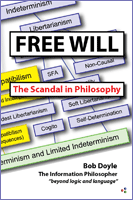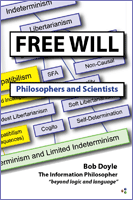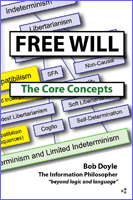Release Date: July 1, 2011
Publication Date: June 19, 2011
Country of Issue: United States
Category: Academic and professional books
Field: Philosophy
|

|
Free Will: The Scandal in Philosophy, by Bob Doyle
480 pages, b&w, 40 figures, 15 sidebars, glossary, bibliography, index.
Paperback ISBN 9780983580201 $29.95 | Hardcover ISBN 9780983580270 $49.95
A sourcebook/textbook on the problem of free will and determinism. Contains a history of the free will problem, a taxonomy of current free will positions, the standard argument against free will, the physics, biology, and neuroscience of free will, the most plausible and practical solution of the problem, and reviews of the work of the leading determinist Ted Honderich, the leading libertarian Robert Kane, the well-known compatibilist Daniel Dennett, and the determinism-agnostic Alfred Mele.
The book describes the first genuinely new position in the free will debates since David Hume in the eighteenth century “reconciled” human freedom with the causal laws of nature and physical determinism.
A Two-Stage Model of free will includes indeterminism in the first “free” stage and adequate determinism in the second “will” stage. Alternative possibilities for action are generated freely in the first stage. These possibilities are evaluated and chosen between in the second stage. The model integrates Robert Kane’s indeterministic Self-Forming Actions, for cases when the second stage does not yield a single possibility for action.
The Two-Stage Model incorporates Daniel Dennett’s Valerian Model and Alfred Mele’s Modest Libertarianism. It is now the most plausible and practical solution to the ancient problem of free will and determinism.
Just as David Hume reconciled freedom of action with Newtonian determinism to give us “compatibilist free will” (Kant called this word-juggling since it remains deterministic), the book describes a line of thinkers (philosophers and scientists) from William James to the author, who have reconciled free will with indeterminism (today this is quantum indeterminacy, as Robert Kane has long maintained).
The Two-Stage Model can be seen as extending and broadening the idea of compatibilism. It is a model of “libertarian free will” that is compatible with a limited indeterminism as well as with an adequate determinism. It is also compatible with two-step Darwinian biological evolution. As Martin Heisenberg argued in Nature, this is a model for free will that can evolve naturally from behavioral freedom in lower animals.
The adequate determinism in the second stage means that our actions are (self) determined by our reasons, motives, feelings, etc. Some libertarians do not like this, fearing that self-determination might mean pre-determination, but it does not. Compatibilists have always wanted their actions to be “determined” by their reasons.
The model also includes indeterminism in the first stage, limited to generating original thoughts - alternative possibilities for action. The indeterminism is the result of ever-present quantum noise in the brain’s information processing and a consequence of new information creation. Indeterminism in the first stage means that actions are not pre-determined from before considerations began, and certainly not from before the agent was born, or in a causal chain from the beginning of the universe, as some hard determinists maintain.
Free Will transcends (including and overcoming) determinism and its opposite, indeterminism.
John Searle called it a scandal that after all the centuries of writing about free will, we have not made much progress. According to Doyle, a more serious scandal today is that academic philosophers are convincing many young students that they are deterministic biological machines with only a “compatibilist free will.”
Doyle recounts the many different forms of determinism that have been used over the centuries to deny human freedom and responsibility. To end the scandal, philosophers need to teach a Two-Stage Model of free will and creativity, one that Doyle finds in the work of a over a dozen philosophers and scientists going back to William James’ talk to Harvard Divinity School students in 1884.
Notes to Editors: This book is based on the Freedom section of the Information Philosopher website (www.informationphilosopher.com/freedom). It is available online at Amazon, Barnes & Noble, in bookstores, and in a number of digital eBook editions (Amazon Kindle, Apple iPad/iPhone, Barnes & Noble Nook, Kobo, and Sony Reader). It is also be available online as a Google Book (PDF).
About the Author: Bob Doyle is a scientist (Ph.D. in Astrophysics, Harvard, 1968), an inventor with multiple patents (Parker Brothers’ Merlin, 1978), an entrepreneur (Super8 Sound, 1973; MicroCosmos, 1974; iXO, 1982), a software developer (MacPublisher for Macintosh, 1984), a journalist (NewMedia, EContent), a web innovator (he helped produce the first podcast in 2003), and a philosopher whose influential website (www.informationphilosopher.com) has highly ranked pages on over 200 philosophers and scientists.
He is currently an Associate in the Harvard University Department of Astronomy faculty.
Doyle wrote MacPublisher, the first desktop publishing program, in 1984 as a tool to help him write this book, but it had to wait for twenty-seven years to get finished. He used the Adobe InDesign desktop publishing program (with Illustrator and Photoshop for the figures) to design and produce the book himself.
Doyle added a digital publishing innovation to the eBook editions. Amazon normally recommends eliminating an index because eBook pages are repaginated depending on font size. But an index is vital for a textbook. And an index needs page numbers. Free Will: The Scandal in Philosophy has page numbers anchored in the text.
Coming this Fall and Winter from i-Phi Press:
Free Will: Philosophers and Scientists (September)
Free Will: The Core Concepts (December)
|

|

|
Contacts:
For more information, an interview with the author or a review copy, please contact i.phi.press@gmail.com.
Or you may contact the author directly - bobdoyle@informationphilosopher.com.
I-Phi Press
77 Huron Avenue
Cambridge, MA, 02138
617-876-5678
Normal |
Teacher |
Scholar